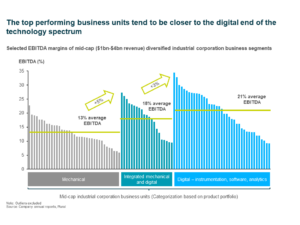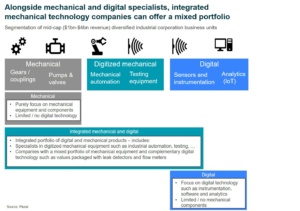Top performing business units tend to be closer to the digital end of the technology spectrum.
Recently, we took a look at the product portfolios of the individual business units of c. 30 mid-sized diversified industrial companies. Business units with a more integrated digital offering across the product portfolio tend to achieve a higher EBITDA margin.

Traditionally, diversified industrial companies have added value through improving the precision of mechanical technology and integrating electronics, controls and automation into their products. Now, value comes from using smart instruments to collect data, and integrating that data into cloud-based software and analytics.
This shift reflects the disruption facing many of these companies’ customers. To gain an advantage, they rely on increasingly sophisticated technology to improve process speed and efficiency, increase asset up-time and make more informed data-driven decisions.
Diversified industrial companies typically have multiple touch-points already installed across customer equipment and therefore are well positioned to drive value through data, analytics and digitized technology.
There are numerous examples of business units moving up the mechanical-to-digital scale. One example is a business unit that started by offering mechanical drive and lifting applications now offers digital solutions for machine health monitoring and fleet management.
Another that focuses on process instrumentation recently acquired a business that will allow it to add value by using predictive analytics to monitor the condition of machines.
What happens to margins when a business a unit shifts its offering towards digital?
To answer this, we studied the annual reports of around 30 mid-cap public companies, each with 3-6 business units.
We split the business units into three broad categories: mechanical, integrated mechanical and digital and digital.

Our analysis suggests that the more integrated a business unit’s technology portfolio, and the bigger its focus on digital technology and analytics, the higher its EBITDA margins are likely to be.
So for diversified industrial companies, incorporating digital solutions into the technology portfolio and offering more creative solutions to customer needs should put them in a premium position with customers and help drive margin improvement.
A digital, data and analytics strategy is now an essential ingredient for diversified industrials businesses. Companies will continue to look to optimize their installed base of mechanical products with sophisticated smart tech and bolster their technology portfolio with digital, data and analytics solutions.
Want to know how more?
Get in touch with Matt Vellacott





